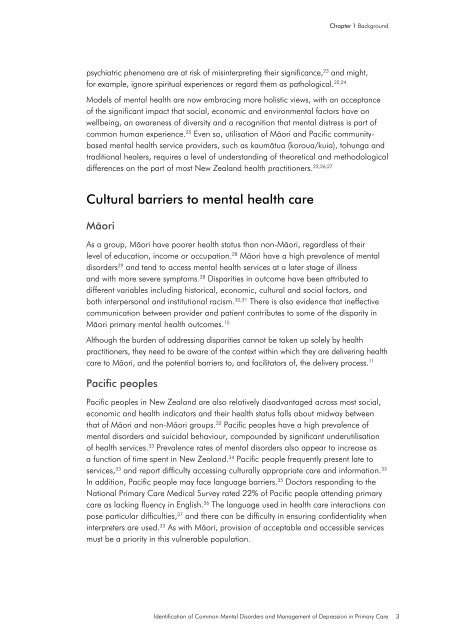Common Mental Disorders Depression - New Zealand Doctor
Common Mental Disorders Depression - New Zealand Doctor
Common Mental Disorders Depression - New Zealand Doctor
You also want an ePaper? Increase the reach of your titles
YUMPU automatically turns print PDFs into web optimized ePapers that Google loves.
Chapter 1 Background<br />
psychiatric phenomena are at risk of misinterpreting their significance, 23 and might,<br />
for example, ignore spiritual experiences or regard them as pathological. 22,24<br />
Models of mental health are now embracing more holistic views, with an acceptance<br />
of the significant impact that social, economic and environmental factors have on<br />
wellbeing, an awareness of diversity and a recognition that mental distress is part of<br />
common human experience. 25 Even so, utilisation of Mäori and Pacific communitybased<br />
mental health service providers, such as kaumätua (koroua/kuia), tohunga and<br />
traditional healers, requires a level of understanding of theoretical and methodological<br />
differences on the part of most <strong>New</strong> <strong>Zealand</strong> health practitioners. 22,26,27<br />
Cultural barriers to mental health care<br />
Mäori<br />
As a group, Mäori have poorer health status than non-Mäori, regardless of their<br />
level of education, income or occupation. 28 Mäori have a high prevalence of mental<br />
disorders 29 and tend to access mental health services at a later stage of illness<br />
and with more severe symptoms. 28 Disparities in outcome have been attributed to<br />
different variables including historical, economic, cultural and social factors, and<br />
both interpersonal and institutional racism. 30,31 There is also evidence that ineffective<br />
communication between provider and patient contributes to some of the disparity in<br />
Mäori primary mental health outcomes. 15<br />
Although the burden of addressing disparities cannot be taken up solely by health<br />
practitioners, they need to be aware of the context within which they are delivering health<br />
care to Mäori, and the potential barriers to, and facilitators of, the delivery process. 11<br />
Pacific peoples<br />
Pacific peoples in <strong>New</strong> <strong>Zealand</strong> are also relatively disadvantaged across most social,<br />
economic and health indicators and their health status falls about midway between<br />
that of Mäori and non-Mäori groups. 32 Pacific peoples have a high prevalence of<br />
mental disorders and suicidal behaviour, compounded by significant underutilisation<br />
of health services. 33 Prevalence rates of mental disorders also appear to increase as<br />
a function of time spent in <strong>New</strong> <strong>Zealand</strong>. 34 Pacific people frequently present late to<br />
services, 33 and report difficulty accessing culturally appropriate care and information. 33<br />
In addition, Pacific people may face language barriers. 35 <strong>Doctor</strong>s responding to the<br />
National Primary Care Medical Survey rated 22% of Pacific people attending primary<br />
care as lacking fluency in English. 36 The language used in health care interactions can<br />
pose particular difficulties, 37 and there can be difficulty in ensuring confidentiality when<br />
interpreters are used. 33 As with Mäori, provision of acceptable and accessible services<br />
must be a priority in this vulnerable population.<br />
Identification of <strong>Common</strong> <strong>Mental</strong> <strong>Disorders</strong> and Management of <strong>Depression</strong> in Primary Care 3

















